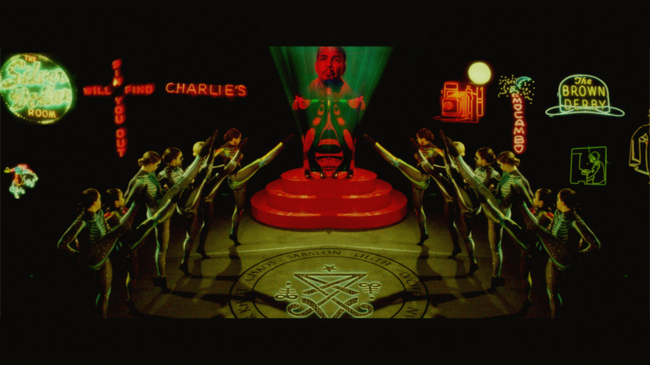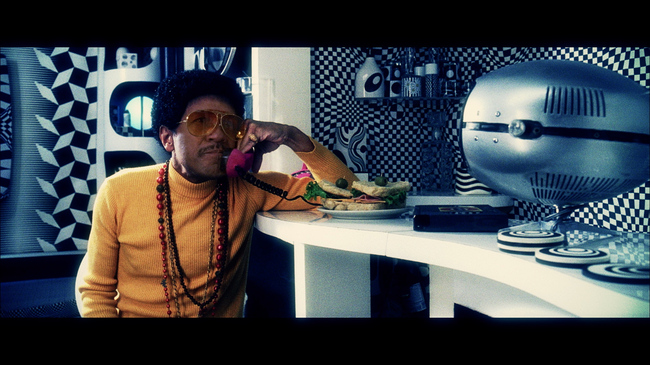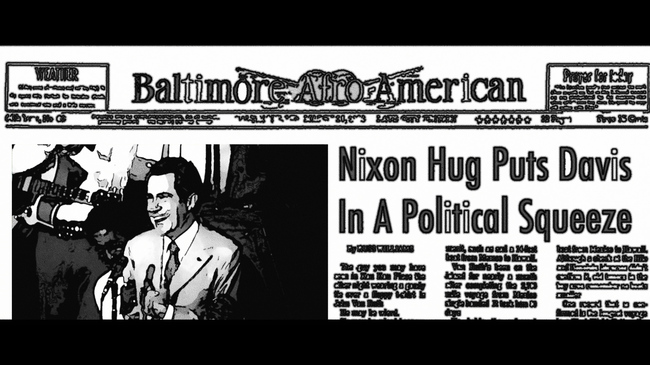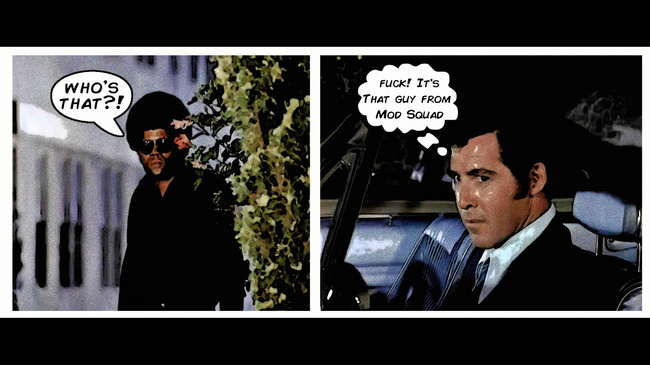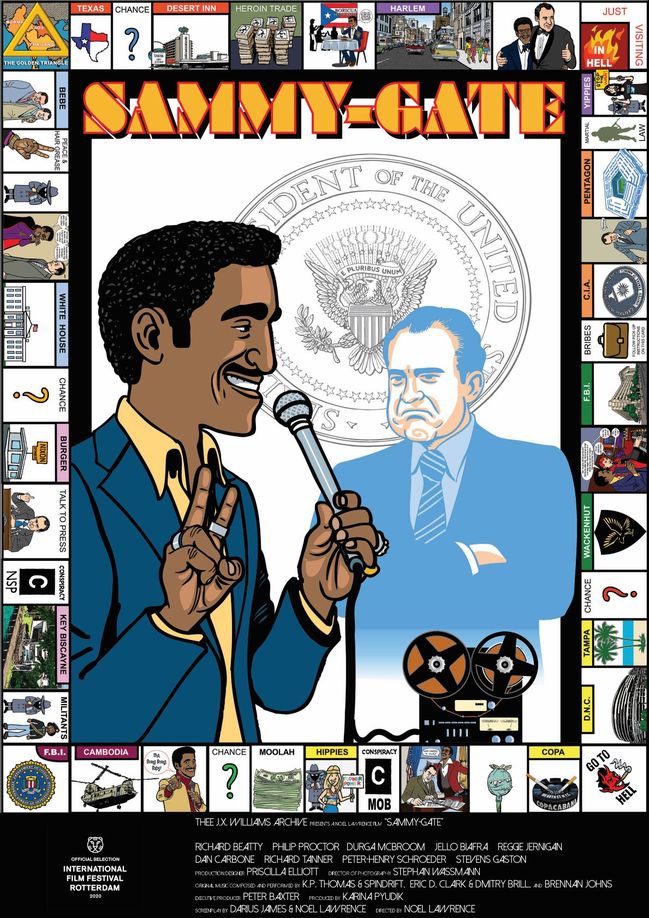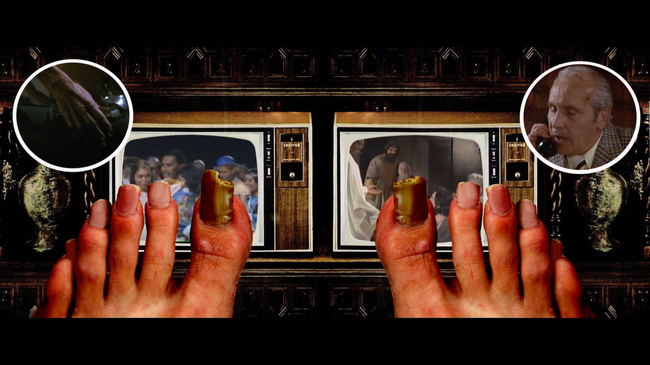Interview: SAMMY-GATE, Noel Lawrence and Darius James Talk Their Psychedelic History Film and Sammy Davis Jr. Himself
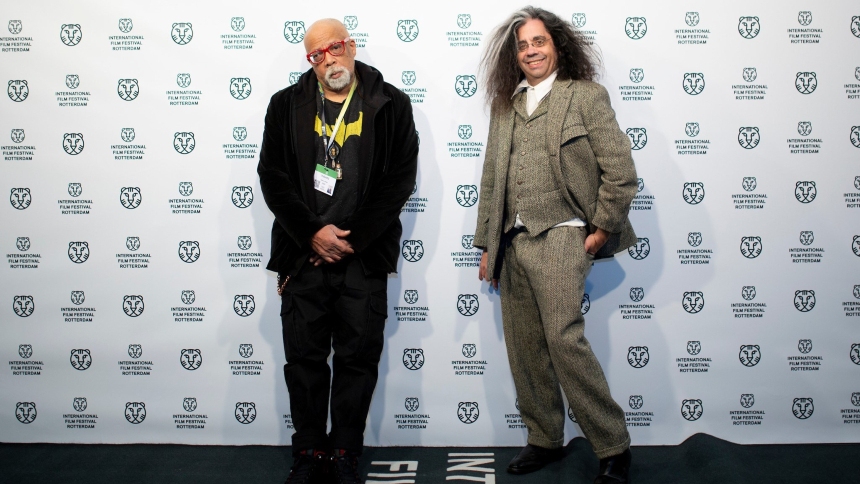
American filmmaker, curator and the founder of Thee J.X. Williams Archive, Noel Lawrence dedicated eight years working on the project Sammy-Gate, alongside writer Darius James, an expert on African-American folk culture and the author of Negrophobia: An Urban Parable and The United States of Hoodoo. Early this year, the film, which is based on the premise that Sammy Davis Jr. could cause Watergate, was revealed at the International Film Festival Rotterdam and in the running for the festival's experimental accolade, Found Footage Award.
Lawrence and James' film merges facts and fiction to deliver a LSD-infused history trip. The invasion of Vietnam, right-wing conspiracy by Howard Hughes, Republican, Democrats, mafia ties and Satanism are all part of the speculative mosaics. Sammy-Gate crosses and subverts the conventions of biopics to delve into a chapter of U.S. history that is stranger than fiction.
ScreenAnarchy caught up with Lawrence and James to talk more about the project, the conflicting persona of Sammy Davis Jr., and the film's mercurial form of docu-fiction that seamlessly stitches together facts, actual and true events, and conspiracy theories, anecdotes and urban myths.
"The facts you are about to see are true. The conclusions...speculative." Ain't that one of the coolest film openings?
Noel Lawrence: I assume you are referring to the monologue that opens the film. My co-writer Darius James narrated the opening montage and I should credit him with that particular line. He is really the brains behind this operation.
It is the opening of your most recent film SAMMY-GATE that blows up a historical footnote of Sammy Davis Jr. causing Watergate into a full-fledged yet psychedelic feature film. How deep was the research you had to conduct while preparing the script? How close did you intend to stick to facts?
I coined a term for the technique we used to write Sammy-Gate: "Psychedelic History." You begin with a set of real historical facts and use them as a launching pad to create a bizarre alternate reality.
Obviously, Sammy Davis, Jr. did not cause Watergate. However, we wanted to present a plausible scenario in which it could happen. So rather than use a set of historical facts to prove a conclusion, you begin with the conclusion and work backwards in search of the facts to prove it.
Accordingly, I had to do an enormous amount of research. That meant a lot of trips to the Richard M. Nixon Presidential Library in Yorba Linda, California.
You see, the only way you could place Sammy Davis, Jr. anywhere near Watergate was because he served as an informal advisor to President Nixon. He worked with an obscure department in the White House known as the Office of Economic Opportunity - OEO. The director of the OEO was none other than a young Donald Rumsfeld. Sammy became close friends with Rumsfeld for the rest of his life. Also, there is a very well researched book called Deconstructing Sammy that claims that Rumsfeld had an affair with Sammy's wife, Altovise Davis.
I am guessing about 60 or 70% of the film is true. The best part is that a lot of the strangest material is factual.
Why was the idea of Sammy Davis Jr. being a member of Anton LaVey's Church of Satan so alluring?
The idea was alluring because IT WAS TRUE! Sammy was a Satanist. We know this because he briefly wrote about it in his autobiography Why Me? though the passage was omitted from the final edition of the book. My man Jake Austen wrote about it.
When I found out Sammy worshipped the devil while serving as an advisor to President Nixon at the same time, I knew I had a film. The notion lends new meaning to the term "Faustian Bargain." Sammy might have gotten a contact high from being close to 'The Prez' but his reputation in the Black community has suffered eternal damnation for that indiscretion.
Before we jump into the semiotics and psychoanalytics of SAMMY-GATE, some sources claimed that the project was expected to be finished in 2016. Is it true and can you elaborate on what evil powers disrupted the originally planned release of SAMMY-GATE?
The evil power is called "no money." Our funding came in small amounts over an extended period of time. Towards the end, I started getting hired as a screenwriter for other projects. Writing screenplays became my 'day job' to pay for Sammy-Gate.
I live and work in Hollywood. You can make films about a limited number of topics in a limited number of ways. And when you go outside certain boundaries, watch out! No one is going to finance your insane passion project.
I can't say I blame execs and financiers for that stance. They need to make a profit on their films and are under no obligation to piss away money on my strange and esoteric visions.
That said, I don't think I could have made this film without being in Hollywood. Los Angeles is filled with the most skilled and talented actors and technicians in the entire world. They usually work on commercial projects and I was offering something fun and different. Though I had no hope of paying their day rate, this project offered a lot more creative freedom than they could find elsewhere.
If there is anyone to thank for my film, it's not me. It's the incredible team that worked on it for eight long years. No one got involved in this project for a huge paycheck. They wanted to be part of a collective work of art. And when we wrapped production in December 2018, the production still had many of the same cast and crew from when we launched principal photography in January 2013.
You noted that despite Davis´s fame and influence, there is no biopic on his person. Why do you think he is shunned, since Nixon's (in)famy burns even brighter during the latest U.S. president?
I think it has something to do with what Malcolm Gladwell called "The Hug Heard Around The World." But I'd like to hand this question over to my co-writer and collaborator Darius James...
Darius James: Sammy's public persona was clumsy. He was an unparalleled singer, dancer, actor, musician and comedian but his skills at managing public perception were shit. It was marked by false enthusiasm and worsened by the fact it was over-cooked.
A rat packer cracks a n****r joke, where he is clearly the butt, Sammy would laugh harder and longer than everyone in the room. It was his way of dealing with incredible anguish. I'm sure Frank's jokes about Sammy's subservience to him triggered memories of being gobbed by white paint during his time in the military.
The Nixon hug was an extension of his fake showbiz behavior and real neediness that broke the camel's back. The sheer number of Sammy's autobiographies Yes, I Can, Hollywood In A Suitcase, Why Me? is evidence of an effort to rehabilitate his public image. Sammy was presented as an example of the 'good Negro' you didn't want marrying your daughter.
Why there is currently no biopic on his life I can give you no answer. If I attempted answering that question I would only lie, giving you some b.s. about Hollywood economics and their marketing departments. The person I would pose this question to is Tommy Davidson and listen to his 20-year tale of development hell.
However, Sammy's clear cry for love withheld by the Kennedys should in no way be compared with the relationship that Steve Harvey's drooling stupidity or Kanye West's contrarian insanity have with the current meat-puppet in the White House. Interesting how the narrative of the successful 'good Negro' always seem to go afoul when there is a public association with a U.S. president.
How was Sammy Davis Jr. a walking contradiction?
Sammy had a lot of connections to a lot of people in many different walks of life. One minute, he was hugging Nixon at the RNC. The next, he was donating money to the Angela Davis Legal Defense Fund. Then, he went to do a guest spot with Archie Bunker on All In The Family.
After that, he became an honorary member of the Blackstone Rangers, a black nationalist street gang on the South Side of Chicago. And like his mentor Frank Sinatra, he had long standing mob ties. There was no way you could play Vegas without their approval.
Among other talents, Davis was a very talented impressionist. He became famous for going on TV and doing imitations of Humphrey Bogart and Cary Grant. But perhaps this ability to impersonate also functions as a metaphor for the soul. He knew how to blend in with his surroundings, whatever they may be.
One thing for sure about celebrities...They want to be liked. And sometimes that chameleonic quality allows them to adopt very different personae depending on the situation. But do they have a center? That was a question I considered when making this film.
How important was Davis to the working-class Black community then and how does it translate to today's circumstances? Were you planning a kind of iconoclasm?
Darius James: I can only answer this question based on my personal experience. I was a child in the 1960s. Black faces were largely absent from mainstream culture, outside of sports and entertainment. Or, I should say, absent from our television screen with the exception of syndicated reruns of Amos-n-Andy and Beulah, subservient or silly characters of questionable conduct.
I also grew up in a bohemian working-class family, meaning my family was involved with the arts; despite the Village Voice's wrong-headedness. At that time, the appearance of a Black face on television other than the aforementioned was a cause for celebration. That meant Harry, Sidney or Sammy. These were supposed to be the male figures we aspired to be. Harry was an island exotic, Sidney was the very paragon of white acceptability and Sammy was the 'cool' one. Had that street flavor. So, yes, he had the working-class vibe I readily embraced.
Was this true of the working class community in general? I don't know. It seemed so but, as a child, I did not know. My mother placed doubt in my mind after she had read Yes, I Can! She said she used to love Sammy but now believed he really wanted to be white. A real anxiety of that time. In reflection, I realize how much of a hero he was to me as a child until Muhammed Ali came along.
Was I planning a kind of iconoclasm with Sammy? That is what I do. I don't set up to be iconoclastic. It is a part of who I am and it occurs naturally. Another way to answer that question is to underscore Sammy Davis, Jr. was a LaVeyan Satanist! Reversals and iconoclasm is a key component of their rituals. So yes. My intention is always iconoclastic.
SAMMY-GATE seesaws between conspiracy theory, urban myth and anecdote. This seems to be a deliberate choice. Were there any limitations, as you are also operating with a poetics of reality which seems to define a lot of projects lately?
My artistic practice always employed a 'poetics of reality' as a means to subvert it. Before I went into film, I was a PhD candidate in Russian literature at Stanford, so I learned a great deal about how to present information in a factual, convincing, and "official" manner. After dropping out of school, I used this ability to fuck with people. Basically, my career has just been one long détournement of reality, most notably with my J.X. Williams project, though I don't want to get into too deep a discussion about that adventure. It's complicated!
Originally, I did follow fairly strict parameters in building the alternate history for the film. For instance, I followed the actual timeline of Watergate pretty closely.
However, the main reason for learning the rules is to break them. Because once you have established a high degree of verisimilitude in the first act of your film, you can go crazy and the audience will be willing to follow you on that journey. They'll follow you right off the cliff!
I recall a useful quote from James Ellroy about his own intensively researched books. It's not that you have to write the truth, it's that you have to make it seem true.
When pondering wilder facts during Nixon´s tenure, weren't you tempted to feature his alleged "gay affair" with Bebe Rebozo, as suggested by Don Fulson in the biography NIXON'S DARKEST SECRETS?
Haha. I heard about that one. Also, J. Edgar Hoover investigated Nixon aides H.R. Haldeman and John Ehrlichmann because they were rumored to have had a homosexual relationship. One of the reasons writers and filmmakers keep returning to Nixon is that he lacked the typical 'alpha male' personality that typifies a U.S. President. There is something all too human about him that makes for great comedy and drama. I don't think we can say the same of JFK or Bill Clinton or George W. Bush. They are pretty boring.
Or maybe run wild on some of the more preposterous theories regarding Bohemian Grove?
Nixon attended Bohemian Grove but didn't like that scene. He called it "The most faggy goddamned thing you could imagine." He claimed he didn't like shaking hands with someone from San Francisco. One thing for sure. Nixon definitely would have gotten cancelled in 2020!
Even though you gathered material on Sammy Davis Jr. that gets the imagination running, the logline "Sammy Davis Jr.: Republican. Satanist. Patriot" alone does that. Did you at any point of writing the script and development think about doing what could be considered a rather conventional portrait without any satirical and LSD bent, and despite your previous projects and background?
I was not in a position to make a conventional film.
The budget for a legitimate Davis biopic would have cost tens of millions of dollars. Period films are not cheap. Do you know how much it cost to build a single set for The Irishman or Once Upon A Time in Hollywood? And once you need to raise that kind of money, you need to bring in a Spike Lee or an Ava DuVernay to direct it. You need to attach big stars and probably find an agency to package the deal.
Not only would I not be able to put together a deal like that. I didn't want to. I had something else I hoped to prove.
There is a sense that pervades the indie film community that films with small budgets need to be about small subjects. The attitude is, like, "Hey, let's make a mumblecore film about relationships with hipster couples in Brooklyn. We'll shoot it in my friend's living room!"
I have no interest in making that kind of a film. I want to make big films about big ideas. And if you are willing to adopt an unconventional style, you don't need $20M to make it. The budget isn't as important as you think. You are only restricted by your imagination.
This film was an attempt to cobble together a new cinematic grammar in order to tackle an ambitious subject. That is why I ended up using an amalgam of found footage, animation, and live action. I used whatever tools were available to tell this story with a minimum of resources and a maximum of creativity.
What was the initial plan when tackling the personality and life of Sammy Davis Jr. for a feature project and how did that evolve into the final form released on the festival circuit?
I wouldn't have made this film were it not for Darius James, who did not just write this screenplay with me but has been a mentor, friend, and my guide in exploring the mysterious universe that is Sammy Davis, Jr. The film evolved enormously from its conception in 2012. We had a script but I doubt more than half of the first draft ended up in the actual film.
To be honest, we didn't have much of a plan at the outset. I had a background in avant-garde cinema and this was my first attempt at a narrative feature. Darius was an experimental writer with no experience in three-act structure.
As a result, most people hated the early cuts of the film. They said the story made no sense. At first, your instinct as 'an auteur' is to push back when you get criticism. But, slowly but surely, I began to listen and make changes. Since we continued to shoot for many more years, Darius and I wrote new scenes and created a storyline that the audience could follow. In a way, I'm glad we only could shoot the film in bits and pieces. We had a lot of downtime to reflect on mistakes and fix things.
You managed to get an interesting crew on board of you project. How did Priscilla Elliott, who worked for Tim Burton, David Fincher, Steven Spielberg or Wes Anderson, became SAMMY-GATE's production designer and what process was needed to end up with the 70s psychedelic counterculture quality of the film´s imagery?
I met Priscilla through our producer Karina Pyudik, who put together a kickass team. Much of the 70s vibe is owed to Elliott, who was able to spin gold out of seemingly nothing. I'm still amazed she had the patience to work on this tiny project for eight years.
But getting a retro vibe involves more than production design. For one thing, you need the right camera equipment. We shot a lot of the film on Panavision gear and glass from the 70s. Single-perf 35mm is really good for a retro look because it's much grainier than double-perf. And you automatically get the 2.35:1 aspect ratio and only have to use half the amount of film. So it's a bargain!
Also, a lot of the psychedelic vibe comes from little things that get ignored by many directors. For instance, your color palette is enormously important. I colored the whole film myself in Magic Bullet Looks and Colorista.
Finally, the music is as important as the visuals. Since we couldn't afford to license famous songs from the 60s, I commissioned a whole new soundtrack from Kirpatrick Thomas, who founded the band Spindrift. He is a music purist and tracked down vintage analog pedals and gear so that we could create an authentic 70s sound. I also got major help from Eric D. Clark and Brennan Johns who both are prodigies.
Together, we created 36 tracks of music. That's a lot of music for a micro-budget film. It would be a lot for a studio film. Anyway, we're actually working on a limited edition vinyl double-album for the soundtrack right now. So stay tuned...
What decisions are behind the widescreen 2.35:1 Cinemascope for the film?
It just felt right. After a decade in small-gauge, avant-garde cinema, I wanted to do something big and wide. Also, Cinemascope has an immersive quality that makes the psychedelia more potent. That's why I really encourage people to see this film in a theatre, when the pandemic is over, of course.
Also, the widescreen format worked very well with the multi-screen techniques that I used in certain sections of the film. With a wider canvas, you can arrange three, six, or eight different screens at the same time.
The use of multi-screens expands the picture's dynamics. You did the editing on the film yourself, if I am not mistaken, what other aesthetics choices were pondering besides Pablo Ferro?
First of all, Pablo was one of my primary inspirations. For those who don't know him, he probably is the most important graphic designer of the 20th Century besides Saul Bass. Stanley Kubrick called him a genius, so what does that tell you?
I'm very thankful I got to work with Pablo briefly before his passing. He wanted me to animate a series of abstract impressionist paintings from an unknown painter, George Cannata Jr. Pablo purchased the collection of paintings in 1962 and always had wanted to animate them into a short film. So, in 2017, I met with him in Arizona to plan out the project. I still have his notes for the film so maybe I'll get to work on it someday. Sammy-Gate only took eight years to complete. Pablo conceived this project 58 years ago and the film still isn't finished!
Anyway, I definitely can cite other inspirations. Santiago Alvarez is one. Kenneth Anger is another. Actually, music was probably more of an influence at times. I was particularly enthralled with a collection of recordings from a pirate radio station in Saigon from the Vietnam War called 'Radio First Termer.' They played acid rock and broadcast highly subversive and satirical messages about the war. In fact, I recreated these broadcasts in my film. Jello Biafra of the Dead Kennedys played the DJ.
Parliament and Funkadelic were huge influences too. I played their early albums on a continuous loop during my final year of editing and animation.
Actually, Pedro Bell, the designer of all the notorious Parliament/Funkadelic album covers, was supposed to design the poster for the film but he passed away right after a mutual friend called him. But his spirit lived on through the amazing work of his protegé Seitu Hayden. Like the film, it required a zillion hours of micro-design work.
The film is more of a visual collage. Why did you opt for this form? I mean, naturally, the form better suits a LSD-induced trip, but besides this reason?
I didn't choose the form. The form chose me. I had no other choice but to work with a crazy quilt pastiche of different formats and media because I didn't have the resources to shoot a film in a more conventional IMR format.
SAMMY-GATE has a plethora of elaborate choices behind the film's form and style. You shot scenes with the lead Richard Beatty, but you also use archival footage to the degree that the film was running for experimental Found Footage Award at this year's International Film Festival Rotterdam. It is strange, since there is an apparent and slightly contradictory clash of utmost mannerism and stylization and so-called reality aesthetics in the film. Why did you go with this hybrid imagery and style?
If I understand you correctly, the 'aesthetics of reality' constitutes an attempt to replicate reality because it will somehow get us closer to 'the truth.' It is an implicit critique of 'Hollywood' as the dream factory of glitz and glamour. And I obviously appreciate the way a film by Steve McQueen or John Cassavetes doesn't feel like a movie. It feels more like a glimpse into real life. This is a legitimate cinematic practice with a long history that dates back to Italian neorealism and so forth.
On the other hand, I am a bit more of a subversive creature. As a casualty of too much Deleuze and LSD, I am very bad at capturing 'the truth.' Rather, I want to open up a space in which we can ask questions about what constitutes history, how it is represented, and who benefits.
Regarding this 'contradictory clash' of realism and stylization, my intent was to create a fever dream, a constant shift between the real and the surreal. It fucks with you because there is the audience expectation a film will do one or the other. You bought a ticket either to see a Jodorowsky film or an Oliver Stone film. However, you don't expect JFK to suddenly morph into El Topo.
How did Richard Beatty handled the personality of Sammy Davies Jr. before he stood before the camera? Where there any lengthy rehearsals or special study of the protagonist?Especially when the plot unfolds under the psychedelic haze.
I found Richard in an open audition.
His website profile mentioned his lifelong ambition was to play Sammy Davis, Jr. in a film. He previously had worked as a Sammy Davis, Jr. imitator. He performed an act with a Cher impersonator on cruise ships. It was called "Sammy & Cher".
So Richard came to the role after a lifetime of already playing Sammy Davis, Jr. He already knew Sammy's bio and personality tics. Nonetheless, my film was a big challenge because it demanded an actor who did more than a superficial imitation of Sammy. We weren't making a parody.
Richard understood this right off the bat. He was uniquely qualified to play Davis. I don't know how I would have managed to make this film without him.
Perhaps, the most difficult scenes involved his guest appearance on 'Soul Talk' where the very imposing talk show hostess raked him over the coals. Just so you know, many of those scenes were improvised. We staged and recorded a 40-minute mock interview between Richard and Durga McBroom. She is better known as a musician and as a backup vocalist for Pink Floyd, along with her solo work, but she delivered an incredible performance.
SAMMY-GATE appears to have many influences. At some point, I could not stop thinking about Monty Python, and only because of Howard Hughes' feet. Can you give a short run-down of possible influences?
Yes, I love the collage aesthetic of Monty Python. And, of course, those techniques can be found earlier in the work of the surrealists or Rodchenko. I didn't consciously model those techniques from any particular artist. Rather, these animations came from a place of necessity. It was an excellent and simple way to depict the story.
Will AN adaption of Ishmael Reed's CAB CALLOWAY STANDS IN FOR THE MOON: D HEXORCISM OF NOXON D AWFUL happen in the foreseeable future?
Were the great Ishmael Reed to allow me to adapt and direct one of his literary masterpieces, I would be deeply honored. And, yes, Darius and I may be working on such a project. As for the 'foreseeable future,' Sammy-Gate took eight years to make. Hopefully, the next film will happen more quickly.
Full disclaimer: Noel Lawrence contributed occasionally to ScreenAnarchy in the past.



